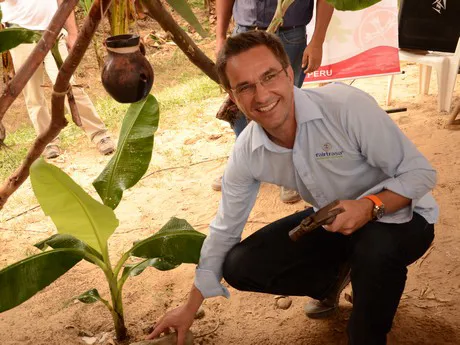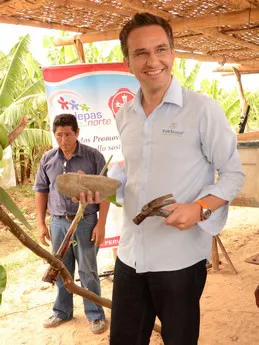Fairtrasa was the first organisation with organic and fairtrade avocados and has continually grown since the company was founded in 2005. In those years Fairtrasa impacted over 40,000 farmers and their families and now plans on increasing such impact significantly. The company just embarked on a new venture to exponentially scale their social farmer developments. “In the coming years, we want to lift one million growers out of poverty,” says founder Patrick Struebi. That requires a new approach. The social entrepreneur talks about Fairtrasa and their new venture: Blooom, a fully integrated AgTech platform to exponentially scale the farmer impact.
“The market for organic and Fairtrade products keeps growing”, says Patrick Struebi. Fairtrasa was founded with the idea of helping growers in Latin America to grow from a subsistence level to economic self-sufficiency. “We want to improve living conditions for farmers and their families by helping them to develop their full potential with direct market access.” For most commercial enterprises, these smallholder farmers are too small to do business with. Fairtrasa, however, specifically chooses to work with these growers and unites them in cooperatives. “We’re a social company, but just like other companies we also need to make a profit,” he explains. “A large part of these profits have been re-invested in the development of our growers. Small-scale growers in developing countries are largely supported by NGOs, whereas we support them independent from any outside donations through our social business model.”

Patrick Struebi, Fairtrasa / Blooom.
Supermarkets choose Fairtrade
The certification of the companies to become organic or Fairtrade-certified is an expensive task. “It’s unattainable for a lot of small growers,” Patrick knows. “It’s very expensive, particularly for smaller farmer cooperatives. Even we have had to halt the process occasionally, because costs were too high.” All of Fairtrasa’s products are organic certified and a large part is also sold with the Fairtrade-label. The combination of these two certificates has a particularly positive market and social impact, especially for bananas, Fairtrasa’s highest selling item.
However, the banana market is increasingly difficult, he explains. “There has been continuous pressure on margins in the last year but we’ve also seen some other interesting trends. For example, due to customer demand large supermarket chains in the US have made conscious decisions to no longer work with banana multinationals like Dole, Chiquita or Fresh Del Monte, but with more socially conscious organisations. I would not be surprised if we might see the same trend to also take hold in Europe.” Supermarkets want to demonstrate their social consciousness to their customers and hence are more willing to pay the additional costs of Fairtrade products.
 Exponential growth necessary
Exponential growth necessary
Although more than 40,000 growers in Latin America have been helped in their development since the company was founded, Patrick isn’t satisfied yet. “Fairtrasa was built based on a linear growth model, however, nowadays there are new technologies available that enable for exponential growth, as Uber and AirBnB have demonstrated in a pretty impressive way” he continues. As a member of the World Economic Forum, Patrick has a strong voice and network to address global challenges such as food security and smallholder poverty to achieve the Sustainable Development Goals (SDG’s). Last year, Patrick together with his partner Krishna Mishra launched Blooom, their ‘Uber for agriculture’, during the United Nations General Assembly week in New York. “With Blooom we bring the immense opportunities that technology offers to agriculture. It’s the next level of farmer development and an impactful continuation of the Fairtrasa mission,” he sums up the company’s activities. “We want every farmer to bloom, worldwide, this is why we have chosen to call our newest company Blooom.”
How does it work? Take a small grower in central India who wonders which crop would be best to grow. Blooom is a fully integrated AgTech platform with a complex algorithm, which provides the grower with the recommendation what to grow considering climate conditions, soil composition as well as the market environment in the region. Via the app, the grower is given best practice advice regarding the production, and he can use the same app to offer the product on the market. All players along the food supply chain are shown on a regional google map. Through this, a grower can reach new markets and obtain a better price than when selling the product to a passing intermediary or on the local market. Another advantage is waste reduction as farmers only have to harvest what they already pre-sold through the app, what increases their efficiency and financial return.
Flourishing growers, also in Europe
Blooom is a joint venture between Fairtrasa and eKutir, an Indian company with the same mission as Fairtrasa. “Blooom is a social business model that could change the world. We want to see growers flourish,” Patrick says, enthusiastically. “It’s a global solution to a global problem.” Blooom is currently active in India, Bangladesh and Nepal and supports some 70,000 farmers and their families.
From this global approach, Patrick also sees opportunities for growers in Europe. “Fairtrade was initially developed to support farmers in developing countries but we also find poverty in agriculture in Europe,” Patrick explains. “A lot of small growers particularly in the South of Spain, France and Italy are struggling to make a living, but they cannot benefit from the fairtrade system. This is where Blooom can also become a life-changer for these farmers, as it provides unprecedented new opportunities to democratise the future of farming,” Patrick concludes.
More information:
Blooom
Patrick Struebi
patrick.struebi@fairtrasa.com
patrick.struebi@blooom.farm
www.blooom.farm
